Memoirs – Chapter 1 – SAPE, the Russian Doll problem and the “black budget” of Merseyside Police
Memoirs – Chapter 1 – SAPE, the Russian Doll problem and the “black budget” of Merseyside Police
The SAPE problem had deliberately hidden itself in code like a Russian Doll inside another Russian Doll (with the smaller Russian Doll pretending to be something it wasn’t). Unauthorised code shouldn’t be there, it had turned up in a regular security test.
Fixing it had been a somewhat frustrating exercise but it had been fixed and there hadn’t been a repeat thankfully. The cause of it though was more interesting and would be the subject of a separate (and somewhat dull) technical report.
Borscht always reminded me of my late grandmother’s liking for beetroot, the dish originated in Ukraine and a Ukrainian saga involving the US President’s impeachment was playing out in domestic US politics whilst domestically here in the UK the Intelligence and Security Committee Report on Russia had been kicked into the long grass until after the general election. On a slightly related topic though my submission to the House of Lords Democracy and Digital Technology investigation can be read here with other submissions published here (you may have to click on View all to see links to all 75 written submissions).
In summer 2019 the British newspapers had published a story based on diplomatic cables describing the US president in unflattering terms which had caused the resignation of the British Ambassador to the United States. There had always an ongoing tension in the UK between the view of the press that they should be free to report and publish on what they wanted versus the view of the state which had gone from merely simmering to boiling over into angry editorials when a senior police officer had made some misguided comments about what the press shouldn’t publish.
“Ignorance of the law is no excuse” also of course applies to Merseyside Police and so this rather meandering introduction leads into a brief journalistic point about a small part of the “black budget” of Merseyside Police, how parts of it were concealed unlawfully (contrary to Parliament’s intent), the Redmond Review and a brief legal history on transparency.
The three examples from Merseyside Police expenditure below may seem somewhat mundane.
The Redmond Review (the result of which will be a report to the Minister) is the long awaited review of the Local Audit and Accountability Act 2014.
Those with long memories may remember back in 2014 – how another part of the same legislation section 40) led to the Openness of Local Government Bodies Regulations 2014 and meant that local government bodies couldn’t stop filming of the public part of their public meetings (in England only).
However another part of the Local Audit and Accountability Act 2014 (section 26) goes back to the Victorian Poor Laws (hence the somewhat archaic language) and gives certain categories of people 30 days each year to inspect and receive copies of financial records (of various local government bodies). It’s interconnected to a right for local government electors to make formal objections to an auditor about either unlawful expenditure or wider issues that could lead to the auditor issuing a public interest report.
Just before the last general election in 2017, in the wash-up period, journalists and citizen journalists were added to the groups of people that can request such documents.
However documents requested were (by Merseyside Police’s numbering 579, 673 and 713).
An interesting aspect to each of these three documents is that the supplier and details of each supplier are redacted – not only from the documents supplied but from the published lists of expenditure over £500 too. Although what the reasons are for departure from the requirements of the Local Government (Transparency Requirements) (England) Regulations 2015 I’m not entirely sure!
Document 579 (over 4 pages) is to do with an insurance claim based on an “incident” that happened on the 28th October 1985 and is an invoice from Weightmans Birmingham branch. The other party is listed as Merseyside Police Authority (which was abolished a number of years ago and was replaced with the Office of the Police and Crime Commissioner for Merseyside).
Many years ago in 1903 local councils established an insurance company called Municipal Mutual Insurance (called MMI) for short. It became quite successful and insured many local government bodies such as police, fire and local councils. However in the early 1990s it suffered losses and its assets fell below the level to be solvent. In what may sound like a cautionary tale with a lot of resonance today for local government bodies today keen to venture into commercial property MMI failed because of investments in commercial property.
Despite MMI having collected insurance premiums it can’t pay out (due to being insolvent) on insurance claims and the liability for the rest of any claim is split (in the case of this invoice 4 ways between Pro Global, Gallagher Bassett, Merseyside Police and MMI).
Why the name of Weightmans (a firm of solicitors) is both redacted from this invoice and also from the list of payments over £500 by Merseyside Police is somewhat puzzling.
Invoice 673 is an invoice for parts (keyboard cables and screen cables). Both are for cables unusually five metres long (yet the cost is £20 each for the keyboard cables and £140 each for the screen cables). Again the supplier is redacted from the invoice but can be ascertained as Attobus Ltd (the parts are presumably cables for the computers and technology in police vehicles).
The third one (713) is for a mechanic doing maintenance on various equipment at Smithdown Lane (air compressor, tyre machines, axle stands etc). The problem however is that “Garage Engineering” is the trading name of a sole trader called Anthony Leigh. Section 26(8) specifically states “Information is not personal information merely because it relates to a business carried on by an individual as a sole trader.”. So it shouldn£t have been redacted in the first place!
Mind you looking through the rest of the invoices supplied, despite “personal data” being defined in both domestic and EU legislation as having to be about living human individuals Merseyside Police have interpreted “personal information” as reasons for redacting the names of dead people, the names of police horses and the names of police dogs!

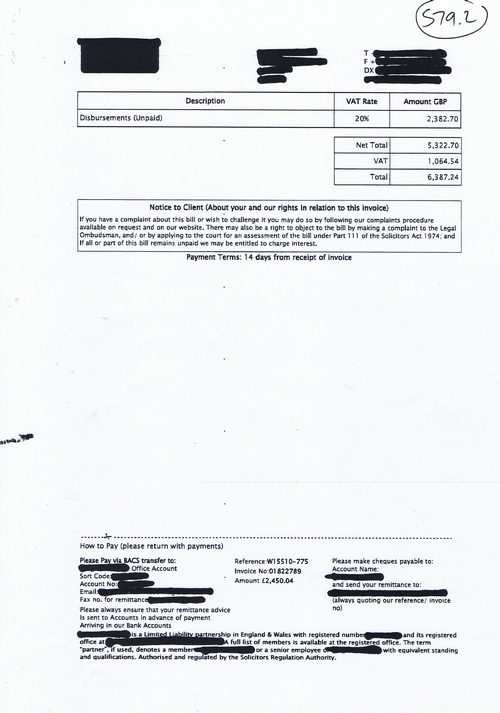
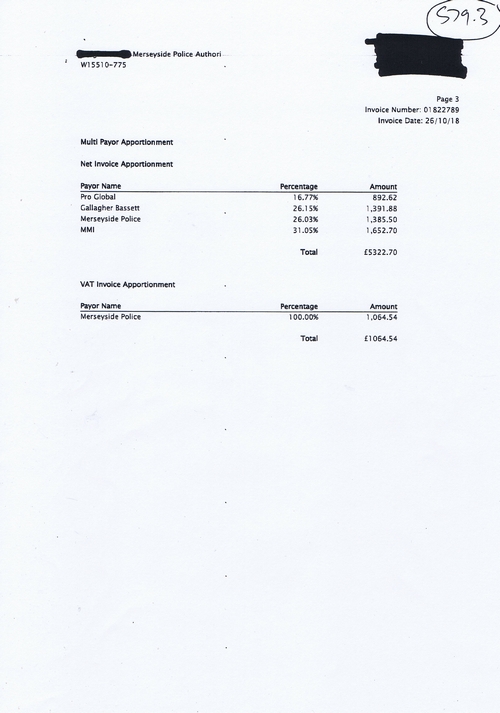

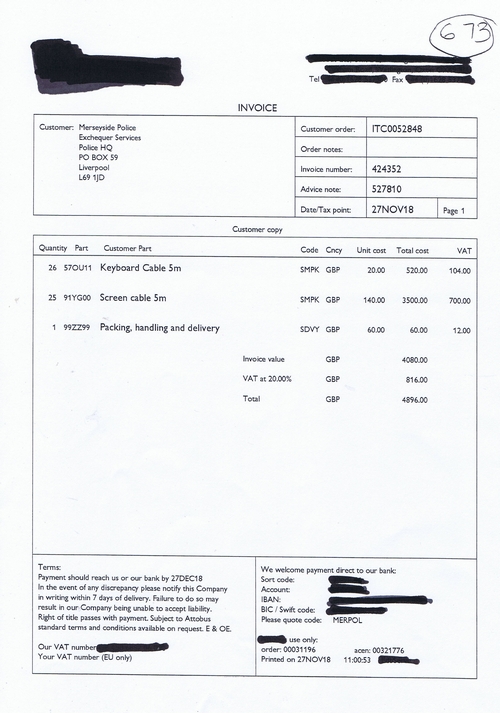
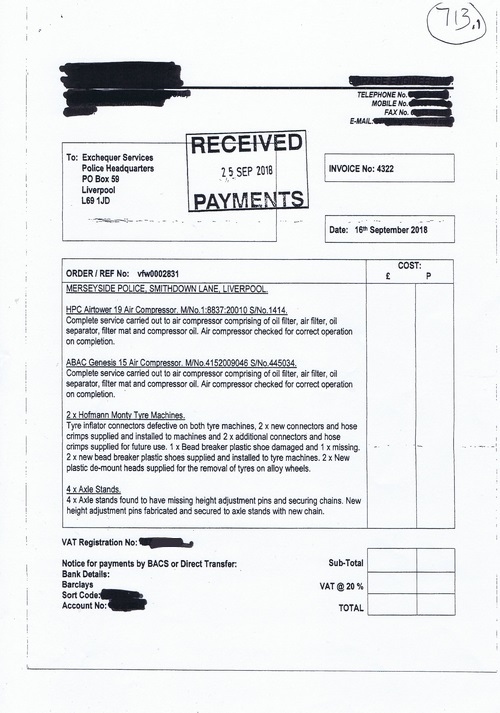
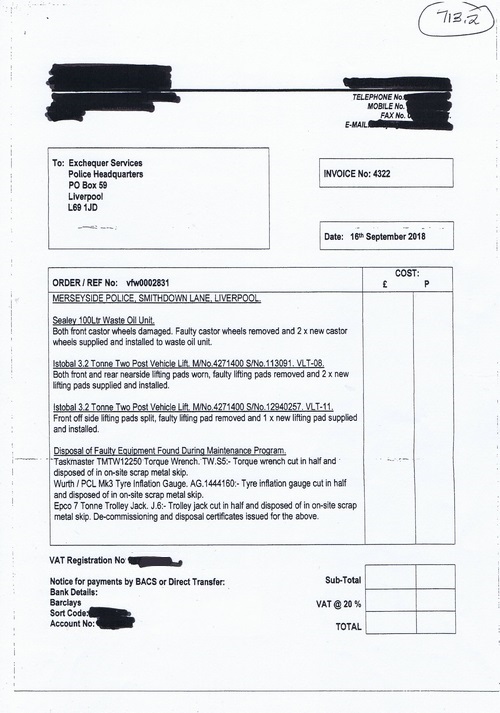
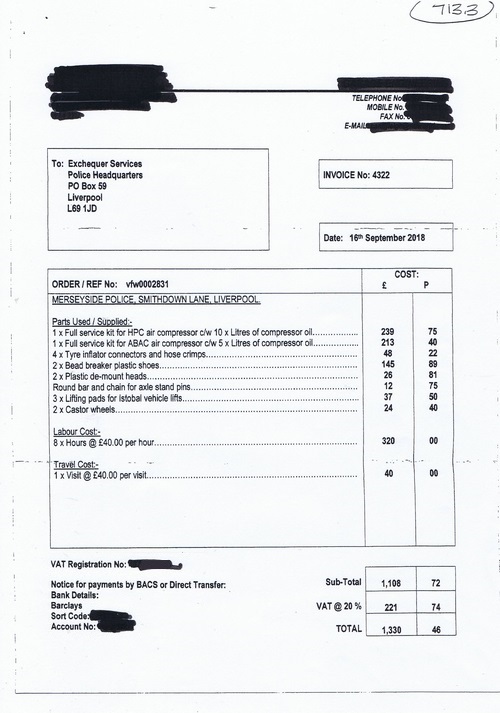
If you click on any of the buttons below, you’ll be doing me a favour by sharing this article with other people.
One thought on “Memoirs – Chapter 1 – SAPE, the Russian Doll problem and the “black budget” of Merseyside Police”
Comments are closed.